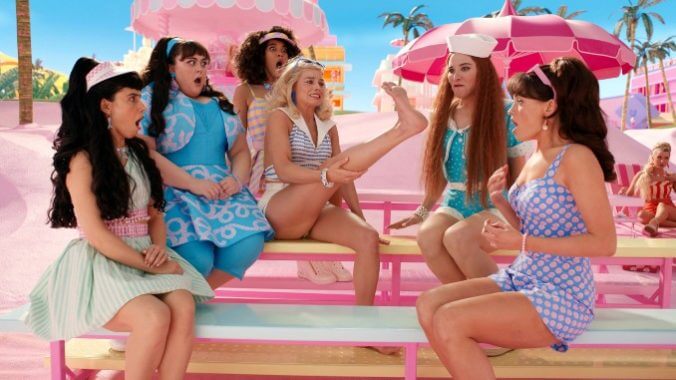Barbie Rejects the Patriarchy like a True Lesbian Icon

It’s already been said a million times, but Greta Gerwig’s record-breaking, earth- shattering, glittery Barbie is basically a masterpiece. It’s heartfelt and charming, while being laugh-out-loud funny and earnest at the same time, all wrapped in a pink-tinged satire that skewers the doll industry, Mattel, Barbie herself and, most importantly, the patriarchy. And while the most prominent messaging of the film revolves around Barbie (Margot Robbie) and her place within our society, each moment and storyline within the film that finds Barbie questioning her place within womanhood, patriarchy, and the real world can be boiled further down from its overarching feminist commentary into a specific subsect of feminine existence: lesbianism.
Barbie’s central message is a critique on the patriarchy (and the matriarchy, for that matter), as it insists that everyone would live fuller and more meaningful lives if we weren’t constantly under the thumb of male dominance and its consequences. That critique becomes even more poignant when considered within the scope of the lesbian identity and experience.
Lesbianism, inherently, is a threat to the patriarchy. In contrast to that pervasive male- dominated, male-centric, and male-obsessed ideology, lesbianism de-centers men. In our society, there are choices we all make that take us down various paths of least resistance, those choices being ways in which we conform to societal standards in order to be met with the least amount of societal pushback. Historically persecuted for not being attracted to men, lesbianism goes directly against the path of least resistance established by the patriarchy by being not reliant on men in any way, shape, or form to live a fulfilling life. In various ways, Barbie finds herself walking against the current throughout the film, moving against the paths of least resistance and towards societal shake-up.
From the very beginning of the film, Barbie is different from the other Barbies within Barbieland. Yes, she is Stereotypical Barbie, but her illusion of perfect conformity is shattered rather quickly when she becomes aware of her own mortality and loses her footing (literally). When her feet become flat (pointedly the improper shape to continue wearing high heels), she is immediately compared to Weird Barbie (lesbian icon Kate McKinnon)—and in Barbieland, the worst thing you can possibly be is similar to Weird Barbie. Weird Barbie is labeled as such (both behind her back and to her face) by the other Barbies because of her marker-covered face, haphazardly chopped hair, and ill-fitting clothes, and the combination presents a perfect metaphor for the patriarchy’s view of the butch lesbian experience. In the eyes of our societal and gendered expectations, butch lesbians’ refusal to conform places them outside the bounds of traditional femininity and the patriarchy’s beauty standards, and Barbie elevates that experience to a comical degree.
Banished to the far corners of Barbieland, Weird Barbie is removed from her femininity and outcast from the feminine experience in the grander sisterhood of Barbieland, but she’s not in with the Kens either. She exists in a gray area between femininity and masculinity, not truly accepted within either box. Pointedly, Weird Barbie did not choose to be that way—her short hair, awkward clothes, and enlightened personality are things she simply cannot change. In many ways, this mirrors the very real fear present within the lesbian community surrounding femininity and the loss of it, and how butches’ presentation as the antithesis of patriarchal standards becomes the tangible representation of how lesbians live on the outskirts of our male-dominated culture. In a society that targets masculine-presenting lesbians more than any other for their refusal to conform, feminine-presenting lesbians will sometimes try to distance themselves from their masc peers, aiming to appease society and the patriarchy—subconsciously or consciously. When Stereotypical Barbie wishes so desperately to choose the other shoe in Weird Barbie’s hand (as opposed to the all-knowing Birkenstock), she is personifying the very real fear of being targeted, wishing instead to hide behind her own intact femininity, even though she knows deep down that she’s more like Weird Barbie than she would care to ever admit.
Beyond her connection to Weird Barbie and how it evolves over the course of the film, Barbie’s relationship with Ken (Ryan Gosling) contains an almost-undeniable lesbian subtext. While it is, of course, totally possible for a straight woman to simply not have feelings for and reject her male bestie, Barbie and Ken’s complicated dynamic goes much deeper than that. Unlike the other Barbies, Barbie has little to no interest in Ken platonically, let alone romantically. He really is just there, and while she does try her best to appease him, the lack of attraction is obvious from their first quasi-romantic interaction as Barbie bodily leans away from Ken’s kiss. But the most important change in their relationship is when Barbie returns from the real world to find Ken living in her once-Dreamhouse (now the Mojo Dojo Casa House), riding the high of patriarchy, masculinity, and horses. While outwardly Ken tries to play it cool by asking Barbie to be his “long-term, long-distance, low-commitment, casual girlfriend,” Ken’s desperation to be with Barbie romantically is still the driving force behind his implementation of the patriarchy into Kendom. In a way, it’s like Ken ushered in the patriarchy solely so that Barbie would be forced to like him, his central plea becoming a cry for Barbie to just conform to his new standards to find happiness and fulfillment. Ken becomes a mirror for every guy that has ever insisted that he could be the one to “turn” a lesbian; he becomes the personification of the idea that the lesbian experience inherently brings pain and suffering, while conformity to society’s rules and regulations could bring about peace and happiness instead.
-

-

-

-

-

-

-

-

-

-

-

-

-

-

-

-

-

-

-

-

-

-

-

-

-

-

-

-

-

-

-

-

-

-

-

-

-

-

-

-








































